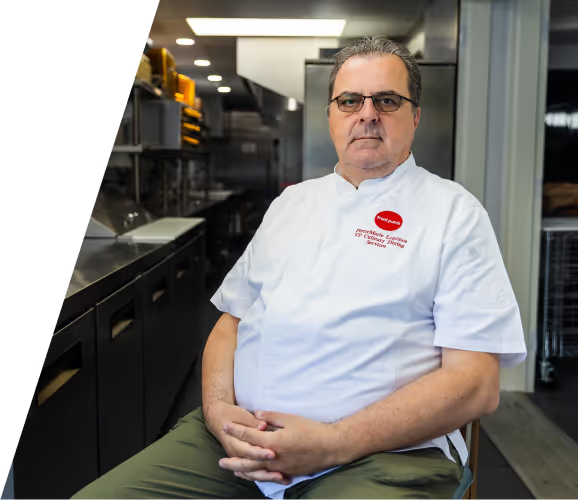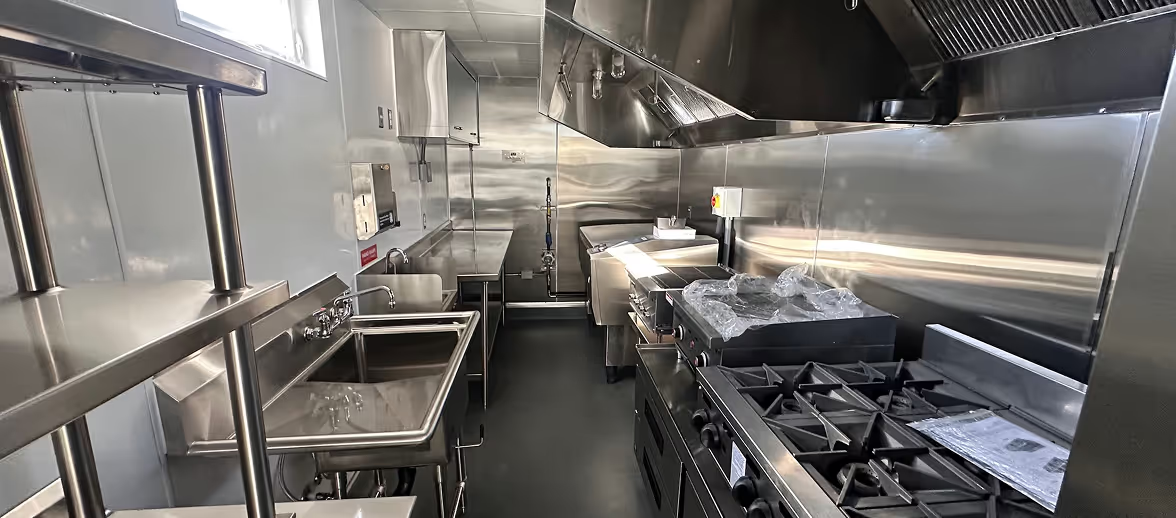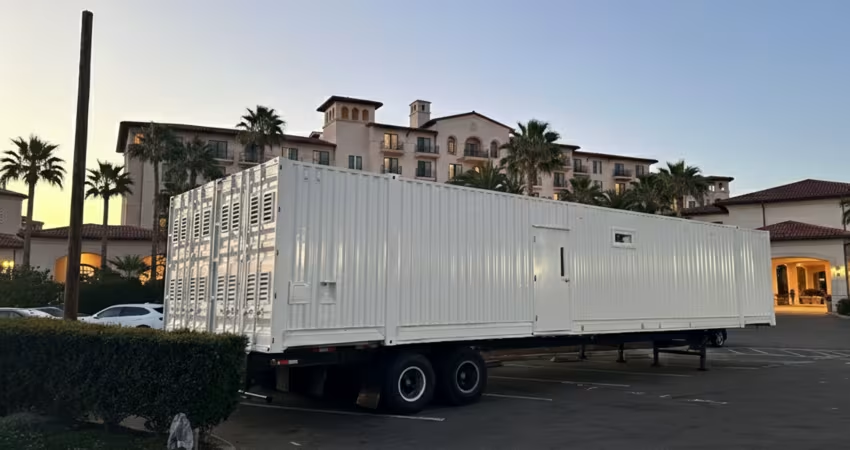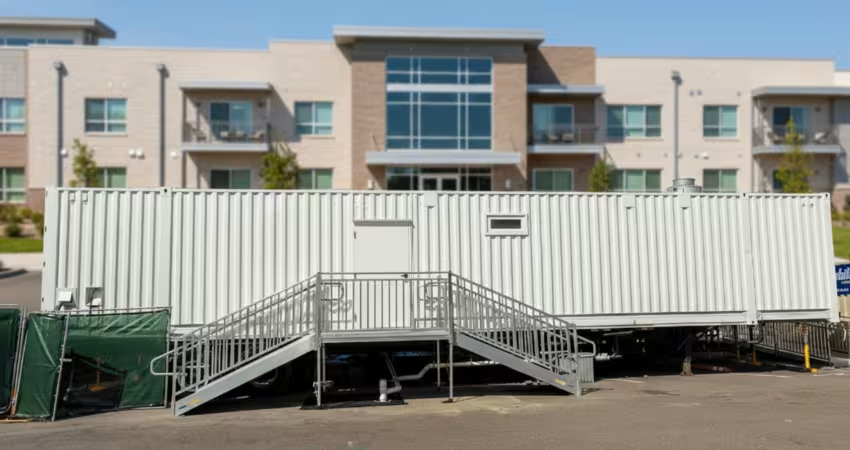%2520(2).jpeg)
Introduction
In the hospitality industry, service disruption is never just an operational hiccup, it’s a reputational and financial risk. Whether it's a luxury resort undergoing kitchen renovations or a boutique hotel facing an unexpected equipment failure, the inability to serve food can mean lost revenue, negative guest experiences, and reduced brand trust. The challenge is maintaining foodservice operations seamlessly through planned upgrades or emergencies. That’s where mobile kitchens come in.
Mobile kitchens offer a dependable, professional, and highly adaptable solution for such scenarios. These commercial-grade and fully equipped kitchens allow hotels and resorts to continue delivering high-quality meals on-site without compromising guest satisfaction or operational efficiency. The demand for mobile kitchen solutions is steadily rising across industries. In fact, the temporary kitchen hire market was valued at $2.54 billion in 2023 and is projected to grow to $3.97 billion by 2032, driven by increasing demand from the hospitality, education, and healthcare sectors.
In this article, we’ll explore why more hospitality leaders are turning to mobile kitchen rentals during disruptions, sharing real-world case studies and practical guidance. Whether you're preparing for a renovation, responding to a crisis, or launching a pop-up experience, a mobile kitchen can make the difference between a service disruption and a success story.
The Hospitality Challenge: Disruptions in Foodservice Operations
Food and beverage services are not peripheral to a guest's experience, they are central. When a hotel kitchen is offline, it's not just the kitchen that's affected, it's the entire guest experience. Room service, event catering, and on-site dining all come to a halt, potentially tarnishing the brand and resulting in negative reviews or even lost bookings.
Moreover, in high-end resorts and conference hotels, foodservice often represents a substantial portion of total revenue. A single day of closure due to kitchen renovation or malfunction could result in thousands of dollars in lost income. Hotels simply cannot afford to lose that continuity and that’s precisely where mobile kitchens come into play.
These disruptions directly impact the guest experience and the bottom line. Consider that:
- 75% of guests check hotel F&B experiences online before booking.
- Short-term closures can cut revenue streams by as much as 40% during peak seasons.
Common Scenarios Requiring Temporary Kitchen Solutions
Hospitality properties can face a variety of situations that call for mobile or temporary food service setups:
- Kitchen renovations that may last weeks or months.
- Unexpected equipment failure like hood system breakdowns or plumbing issues.
- Seasonal or large-scale events that demand increased prep and cooking capacity.
- Natural disasters or water/fire damage rendering kitchen spaces temporarily unusable.
Each of these cases demands a fast, reliable, and compliant solution and mobile kitchens check all the boxes!
.jpeg)
What Is a Mobile Kitchen and How Does It Work?
A mobile kitchen trailer is a full-scale commercial kitchen mounted on a durable, towable platform. It is engineered to meet the same health, fire, and safety standards as permanent kitchens.
Key components include:
- Trailer: Built on a durable, DOT-compliant platform engineered for mobility, stability, and long-term outdoor use.
- Cooking: Equipped with commercial-grade appliances like high-BTU ranges, convection ovens, griddles, and fryers, customizable to meet operational needs.
- Refrigeration: Includes reach-in units and optional walk-in coolers or freezers to support bulk cold storage and food safety compliance.
- Washing: Integrated 3-compartment sinks, handwashing stations, and dishwashing systems that meet health and sanitation codes.
- Add-Ons: Modular options such as propane tanks, grease traps, fresh and greywater tanks, and additional utility or storage modules.
These mobile units are NFPA-compliant and NSF-certified, and are inspected locally to ensure regulatory compliance before operation.
Why Hotels and Resorts Choose Mobile Kitchens
The benefits of using commercial mobile kitchens extend well beyond just convenience. For hospitality leaders, here are the critical advantages:
Rapid Deployment
Mobile kitchens can be operational within 24–72 hours depending on complexity, minimizing downtime. In fact, they can be deployed 50% faster than permanent builds, especially relevant as 70% of contractors report project delays due to labor shortages.
Operational Continuity
Whether it’s a fine-dining restaurant, banquet service, or poolside bar, mobile kitchens allow hotels and resorts to maintain seamless foodservice operations during transitions. Guests continue receiving high-quality meals, scheduled events proceed without disruption, and kitchen downtime is avoided entirely.
Cost Effective
Compared to constructing a temporary kitchen or retrofitting existing spaces, mobile kitchen rentals offer a more budget-friendly solution. They eliminate the high costs of structural build-outs, and their plug-and-play nature means lower labor and utility setup expenses. Additionally, teardown is simple and quick, avoiding extended closure periods.
Health & Safety Compliance
Reputable providers design their units to meet or exceed local health and fire codes, including NSF-rated prep surfaces, commercial-grade ventilation, and ADA accessibility. This ensures operators stay compliant with regulations and significantly reduces the risk of fines or shutdowns due to code violations.
Flexibility & Mobility
Mobile kitchens are designed for flexibility whether the need is short-term or long-term, on-site or at a satellite venue. They can be relocated, reconfigured, or scaled up with support units like dishwashers and cold storage, making them ideal for dynamic hospitality environments.
.jpeg)
Case Studies: Mobile Kitchens in Action
Enhancing Continuity During Renovations
Renovations often mean months without kitchen access. Mobile kitchens help maintain uninterrupted foodservice during these periods, allowing properties to avoid revenue losses and maintain guest satisfaction.
Example: During a five-month renovation, a prestigious country club in California deployed a 2x53' mobile kitchen setup to maintain uninterrupted and high-end foodservice. Provided by Mobile Culinaire, the configuration included walk-in coolers, dry storage, and a dishwashing area, all designed for long-term use with optimal workflow. Fully compliant with California codes, the unit ensured seamless operations without compromising on quality or guest experience.
Emergency Response and Disaster Recovery
After natural disasters like hurricanes or wildfires, foodservice recovery is critical. Mobile kitchens can be operational in under 72 hours, helping properties resume services quickly.
Example: As part of Portland’s 2022 TASS initiative, ContekPro developed and built modular units specifically designed for high-demand and high-traffic environments. These included a mobile kitchen, restrooms, showers, and laundry facilities. The kitchen was equipped with commercial-grade appliances to support efficient and continuous meal preparation. Restroom and laundry units featured ADA-compliant fixtures and durable, high-quality equipment to ensure both accessibility and long-term reliability for more than 100 shelter residents.
Managing Seasonal Volume Spikes
During peak seasons, additional kitchen capacity becomes essential. Mobile kitchens provide overflow support without the need for permanent expansion.
Example: A mountain resort added a trailer to meet banquet demand during the holidays, preventing service delays and boosting event capacity.
Serving Remote or Outdoor Venues
For remote or temporary venues without permanent infrastructure, mobile kitchens make premium foodservice possible.
Example: A desert resort used a mobile kitchen to support a seasonal outdoor dining concept, bringing gourmet service to an off-grid location.
Test Kitchens for New Culinary Concepts
Before investing in permanent menu or concept changes, chefs and culinary teams use mobile kitchens as test environments. These units offer a low-risk, high-flexibility solution for experimenting with foodservice models.
Example: A resort chain piloted a plant-based dining concept using a mobile kitchen, collecting feedback and optimizing recipes before rolling it out across all properties.
Staff Training and Onboarding
Mobile kitchens can serve as controlled environments for onboarding new culinary staff or training seasonal hires before they join the main kitchen.
Example: A prestigious private club in California used a Mobile Culinaire 2x53’ mobile kitchen not just for uninterrupted service during renovation, but also as a training ground for staff adapting to a new culinary organization and equipment. The unit, equipped with high-end appliances including a Rational combi oven, walk-in cooler, freezer, dry storage, and a dedicated dishwashing room, enabled the team to onboard effectively while maintaining elite service standards. Designed for mobility and long-term use, it was also scheduled for future deployments at other locations.
VIP or Private Events
For weddings, galas, or corporate retreats, mobile kitchens allow for discreet, on-site meal prep tailored to intimate or exclusive experiences.
Example: A winery estate partnered with a luxury mobile kitchen vendor to prepare chef-curated menus at a secluded hilltop venue for VIP guests.
.jpeg)
Choosing the Right Commercial Mobile Kitchen for Your Property
Factors to Consider Before Deployment
Every hotel or resort has unique operational needs. Choosing the right mobile kitchen setup involves considering:
- Menu Complexity: What type of menu will you serve (light fare or full-service dining)?
- Volume Requirements: How many meals per day must the kitchen produce?
- Space Constraints: Where will the unit be placed, and how will it be accessed?
- Utilities: What’s available on-site in terms of power, water, and gas?
- Duration of Use: Will the kitchen serve for a few weeks during renovations, or will it be needed for several months due to construction delays or seasonal demand?
You’ll also want to ensure the unit is designed with hospitality-level service in mind and not just functionality, but ease of use, comfort for the staff, and efficient flow for service delivery.
Rent vs. Purchase: What's Right for You?
- Mobile kitchen for rent is ideal for short-term needs: renovations, seasonal spikes, or temporary closures.
- Purchasing may suit resort brands that operate remote pop-ups, permanent offsite catering, or expansion phases that require long-term service continuity.
- Cost and ROI should be evaluated based on duration, frequency of use, and storage feasibility. Rental costs for mobile kitchens typically range from $3,000 to $10,000 per month, depending on size, equipment, and service needs. Additional costs may include delivery, setup, permitting, and support trailers. Purchasing a mobile kitchen can range from $100,000 to $250,000+, making it a viable option for properties with long-term or recurring needs. For more detailed information about rental costs, read our article here.
.jpeg)
Why Hospitality Leaders Choose Mobile Culinaire’s Mobile Kitchens
Industry-Leading Experts
With decades of experience in the temporary kitchen sector, Mobile Culinaire brings unmatched expertise to hospitality operations. From five-star hotels to event venues, we deliver insights and solutions that work.
Commercial-Grade Quality
Every unit is outfitted with top-tier commercial appliances, NSF-certified prep stations, and reinforced construction built to withstand the rigors of high-volume, high-frequency service. It’s performance you can count on.
Rapid Setup with Minimal Disruption
Our streamlined logistics and permitting process allow your mobile kitchen to be fully operational with minimal lead time. We handle the details so you can focus on delivering an uninterrupted guest experience.
Support Units Available
Need more than just a kitchen? We offer a full suite of support units (refrigerated trailers, prep kitchens, dishwashing trailers, etc), giving you the flexibility to scale operations as needed. For more information about essential add-ons, read our detailed guide here.
Flexible and Scalable Layouts
Whether you need a compact 32’ unit or a dual 53’ kitchen complex, our floor plans are designed to mirror your workflow. From room service and pop-ups to full-scale banquets, we tailor each setup to fit your culinary operations.
%2520(1).jpeg)
Conclusion
For hotels and resorts, mobile kitchens are more than temporary fixes, they’re strategic tools that sustain guest experience, protect revenue, and preserve operational continuity. Whether you're planning a renovation, recovering from a crisis, or hosting an exclusive culinary event, a mobile kitchen can ensure your service never misses a beat.
With the global market for temporary kitchens growing rapidly, valued at over $2.5 billion, hotels and resorts are increasingly seeing mobile kitchens not as a stopgap, but as a strategic investment in guest experience continuity.
For a premium mobile kitchen tailored to your hotel or resort, explore our mobile kitchens or contact our team to start planning your custom solution.
People Also Ask (FAQ)
What is a mobile kitchen used for in the hospitality industry?
Hotels and resorts use mobile kitchens to maintain uninterrupted foodservice during renovations, equipment failures, or high-demand events. They are also used for pop-up operations or off-site catering.
How do mobile kitchen rentals benefit hotels during renovations?
They enable hotels to continue F&B services without interruption, preserving guest satisfaction and revenue while avoiding costly temporary builds.
How do mobile kitchen trailers comply with health and safety codes?
They include built-in ventilation, fire suppression, and sanitation systems, and meet NFPA, NSF, and local inspection standards.
Testimonial

"What is standing out when you look at the mobile kitchen operation is the efficiency that we can really achieve because it's built for that."
Tell us about your kitchen needs and request a quote.
.png)
Turnkey mobile kitchen
.png)
Proudly made in-house in the USA
.png)
Commercial grade kitchen equipment
.png)
Code-compliant
Trusted by Industry Leaders




.gif)



%20(1)%20(1).avif)